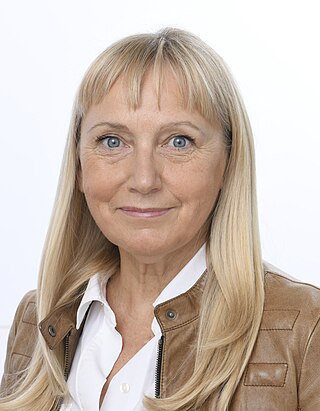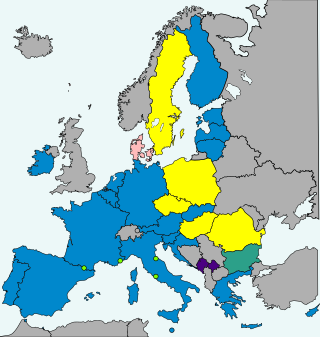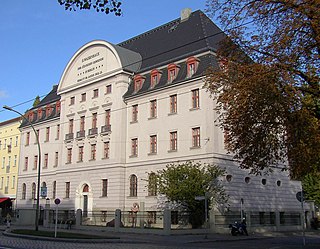
The Council of the European Union, often referred to in the treaties and other official documents simply as the Council, and informally known as the Council of Ministers, is the third of the seven Institutions of the European Union (EU) as listed in the Treaty on European Union. It is one of two legislative bodies and together with the European Parliament serves to amend and approve or veto the proposals of the European Commission, which holds the right of initiative.

An orphanage is a residential institution, total institution or group home, devoted to the care of orphans and children who, for various reasons, cannot be cared for by their biological families. The parents may be deceased, absent, or abusive. There may be substance abuse or mental illness in the biological home, or the parent may simply be unwilling to care for the child. The legal responsibility for the support of abandoned children differs from country to country, and within countries. Government-run orphanages have been phased out in most developed countries during the latter half of the 20th century but continue to operate in many other regions internationally. It is now generally accepted that orphanages are detrimental to the emotional wellbeing of children, and government support goes instead towards supporting the family unit.

Sergey Dmitrievich Stanishev is a Bulgarian politician who served Prime Minister of Bulgaria from 2005 to 2009. A member of the Socialist Party, which he led from 2001 to 2014, he later served as Member of the European Parliament from 2014 to 2024. Stanishev was also the President of the European Socialists from 2011 to 2022 and a Member of the National Assembly from 1997 to 2005 and from 2009 to 2014.
The Green Party of Bulgaria is an environmentalist political party in Bulgaria. It was founded in Sofia in 1989 by Aleksandar Karakachanov, who later went on to become the chairperson of the party.

Barry Andrews is an Irish politician who serves as a Member of the European Parliament (MEP) for the Dublin constituency. He is a member of Fianna Fáil, part of Renew Europe. He previously served as Minister of State for Children from 2008 to 2011. He was a Teachta Dála (TD) for the Dún Laoghaire constituency from 2002 to 2011.
Kate Blewett is a documentary film-maker in the United Kingdom. She is best known for her documentaries on human rights abuses, such as The Dying Rooms and Bulgaria's Abandoned Children.
The history of Bulgaria from 1990 to the present is the period of Bulgarian history that begins after the fall of Communism and the transition to a market economy.

Bulgaria joined the Council of Europe and ratified the European Convention on Human Rights in 1992 and joined the European Union in 2007. Despite this, Bulgarian compliance with human rights norms falls below the standard expected of an ECHR signatory. The European Court of Human Rights noted that of 596 applications dealt with by the Court in 2022, 25 resulted in a judgement finding at least one human rights violation.
Hope and Homes for Children (HHC) is a British registered charity operating and working with children, their families and communities in several countries in Central and Eastern Europe and Africa, to help children grow up in safe and productive environments. The charity moves children out of institutions into family-based care, helps keep together families who are at risk of breakdown due to the pressures of poverty, disease or conflict, and works to prevent child abandonment.

Elena Nikolova Yoncheva is a Bulgarian freelance journalist and politician who has been serving as a Member of the European Parliament since 2019.

Bulgaria plans to adopt the euro and become the 21st member state of the eurozone. The Bulgarian lev has been on a currency board since 1997, with a fixed exchange rate initially against the Deutsche Mark and subsequently its replacement the euro. Bulgaria's target date for introduction of the euro was 1 January 2025. However, the 2024 ECB convergence report concluded that Bulgaria did not meet the convergence criteria due to high inflation, so this timeline has been delayed. The Bulgarian National Bank and several Bulgarian politicians have expressed their desire to join as soon as possible, and project that inflation will be low enough by the end of 2024. If Bulgaria adopts the euro, it will become the second national currency of the country after the lev, which was introduced over 140 years ago. The fixed exchange rate is 1.95583 lev for 1 euro.

Ivaylo Georgiev Kalfin is a Bulgarian politician. A three-term deputy, he was Minister of Foreign Affairs of Bulgaria and Deputy Prime Minister from 2005 to 2009 in the Stanishev Cabinet. Kalfin was a Member of European Parliament between 2009 and 2014. Between 7 November 2014 and May 2016 he served as Deputy Prime-Minister of Bulgaria, and Minister of Labor and Social Policy in the Second Borisov Cabinet.
Events from the year 2007 in Bulgaria

The accession of North Macedonia to the European Union has been on the current agenda for future enlargement of the EU since 2005, when it became an official candidate for accession. The Republic of Macedonia submitted its membership application in 2004, thirteen years after its independence from Yugoslavia. It is one of nine current EU candidate countries, together with Albania, Bosnia and Herzegovina, Georgia, Moldova, Montenegro, Serbia, Turkey and Ukraine.

The Treaty of Lisbon is an international agreement that amends the two treaties which form the constitutional basis of the European Union (EU). The Treaty of Lisbon, which was signed by all EU member states on 13 December 2007, entered into force on 1 December 2009. It amends the Maastricht Treaty (1992), known in updated form as the Treaty on European Union (2007) or TEU, as well as the Treaty of Rome (1957), known in updated form as the Treaty on the Functioning of the European Union (2007) or TFEU. It also amends the attached treaty protocols as well as the Treaty establishing the European Atomic Energy Community (EURATOM).
Bulgaria does not recognize same-sex marriage or civil unions. Though these issues have been discussed frequently over the past few years, no law on the matter has passed the National Assembly. In September 2023, the European Court of Human Rights ordered the government to establish a legal framework recognizing same-sex unions.

Institute of Modern Politics is an independent policy institute based in Sofia, Bulgaria, EU. It is registered under Bulgarian legislation as a public benefit, non-profit foundation. Its team is multidisciplinary and consists of legal practitioners and scholars, social and political science experts, and economists. Its stated mission is to "be a leading source of independent research on legislative and government policies, and based on that research, to promote informed debate and to provide innovative, practical recommendations that advance good governance and human rights in Bulgaria".

Deinstitutionalisation is the process of reforming child care systems and closing down orphanages and children's institutions, finding new placements for children currently resident and setting up replacement services to support vulnerable families in non-institutional ways. It became common place in many developed countries in the post war period. It has been taking place in Eastern Europe since the fall of communism and is now encouraged by the EU for new entrants. It is also starting to take hold in Africa and Asia although often at individual institutions rather than statewide. New systems generally cost less than those they replace as many more children are kept within their own family. Although these goals have been made internationally, they are actively being working towards as reform and new reforms are put into practice slowly as is fit for each country.

Bulgaria–North Macedonia relations are the bilateral relations between the Republic of Bulgaria and the Republic of North Macedonia. Both countries are members of the Council of Europe, and NATO. Bulgaria is a member of the European Union. Bulgaria was the first country to recognize the independence of its neighbour in 1992. Both states signed a friendship treaty in 2017. North Macedonia has been attempting to join the EU since 2004, while EU governments officially gave their permissions to enter accession talks in March 2020. Nevertheless, North Macedonia and Bulgaria have complicated neighborly relations, thus the Bulgarian factor is known in Macedonian politics as "B-complex".

Boyko Metodiev Borisov is a Bulgarian politician who served as Prime Minister of Bulgaria on three separate occasions, serving a total of 9 years between 2009 and 2021, making him Bulgaria's longest-serving post-communist Prime Minister. He has also served as leader of the GERB party since 2010.














